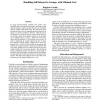Free Online Productivity Tools
i2Speak
i2Symbol
i2OCR
iTex2Img
iWeb2Print
iWeb2Shot
i2Type
iPdf2Split
iPdf2Merge
i2Bopomofo
i2Arabic
i2Style
i2Image
i2PDF
iLatex2Rtf
Sci2ools
121
click to vote
AAAI
2006
2006
Handling Self-Interest in Groups, with Minimal Cost
In group decision-making problems that involve selfinterested agents with private information, reaching socially optimal outcomes requires aligning the goals of individuals with the welfare of the entire group. The well-known VCG mechanism achieves this by requiring specific payments from agents to a central coordinator. However, when the goal of coordination is to allow the group to jointly realize the greatest possible welfare, these payments amount to an unwanted cost of implementation, or waste. While it has often been stated that the payments VCG prescribes are necessary in order to implement the socially optimal outcome in dominant strategies without running a deficit, this is in fact not generally true. (Cavallo 2006) specified the mechanism that requires the minimal payments among all mechanisms that are socially optimal, never run a deficit, and are ex post individual rational with an anonymity property. The mechanism achieves significant savings over VCG in a broad range of ...
Related Content
| Added | 30 Oct 2010 |
| Updated | 30 Oct 2010 |
| Type | Conference |
| Year | 2006 |
| Where | AAAI |
| Authors | Ruggiero Cavallo |
Comments (0)

